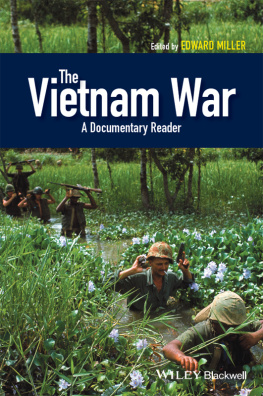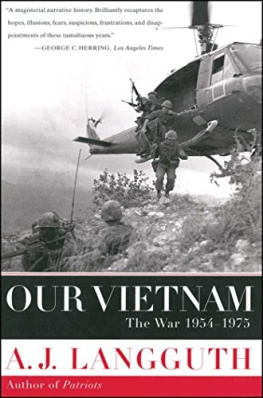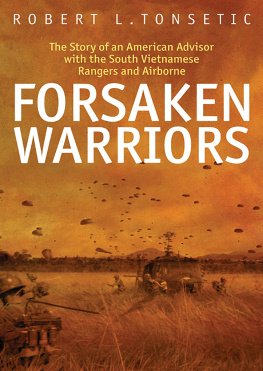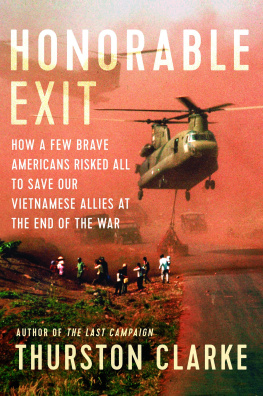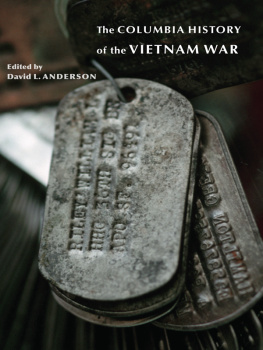
NAVAL INSTITUTE PRESS
Annapolis, Maryland
The latest edition of the work has been brought to publication with the generous assistance of Marguerite and Gerry Lenfest.
Naval Institute Press
291 Wood Road
Annapolis, MD 21402
2008 by Rufus Phillips
All rights reserved. No part of this book may be reproduced or utilized in any form or by any means, electronic or mechanical, including photocopying and recording, or by any information storage and retrieval system, without permission in writing from the publisher.
ISBN 978-1-61251-562-5
The Library of Congress has cataloged the hardcover edition as follows:
Phillips, Rufus.
Why Vietnam matters : an eyewitness account of lessons not learned / Rufus Phillips.
p. cm.
Includes bibliographical references and index.
1. Vietnam War, 19611975United States. 2. VietnamHistory19451975. 3. Phillips, Rufus. I. Title.
DS558.P49 2008
959.7043dc22
2008023335

 Print editions meet the requirements of ANSI/NISO z39.48-1992 (Permanence of Paper).
Print editions meet the requirements of ANSI/NISO z39.48-1992 (Permanence of Paper).
14 13 12 11 10 9 8 9 8 7 6 5 4 3 2 1
For my wife, Barbara, our children, and our grandchildren.
For the 195456 Saigon Military Mission.
For the volunteers of USOM Rural Affairs,
Americans and Vietnamese.
And for all those who died for a just but imperfectly pursued cause.
Contents
By Richard Holbrooke
I n 1951, at the height of the Cold War, the CIA spotted a talented young man at its favorite recruiting grounds, Yale University. Thus began the saga of Rufus Phillips, one of the most remarkable figures of Americas tortured involvement in Vietnam. Rufus got to Saigon in August 1954, shortly after the French defeat in Indochina. It was a critical time for the region. The United States was replacing the French as the major outside power, and the Viet Minh (the Vietnamese communists, led by Ho Chi Minh), who already controlled the northern half of the nation, were soon to begin a twenty-year drive to unify Vietnam under their control. Working under the legendary and controversial Edward Lansdale (the model for the character of Colonel Hillandale in the bestselling book The Ugly American), Rufus rose rapidly. He was intelligent, energetic, and charismatic.
Eight years later he was back in Vietnam, running a groundbreaking division of the United States foreign aid mission called the Office of Rural Affairs, dedicated to what would be called today nation building. (In those days it was usually referred to as pacificationa word no longer politically correct.) And one year after that, Rufus Phillips became my first boss.
I had joined the Foreign Service in 1962, drawn to it by President John F. Kennedys stirring calls to public service. Others in my generation went into the Peace Corps, or rode freedom buses south to fight segregation. As for me, in part because my best friend in high school had been David Rusk, whose father, the future secretary of state, had talked to our senior class about something called the Foreign Service, I took and passed the Foreign Service exam when I was a senior in college. I entered the Foreign Service one month after graduating. Less than a year later, after language training and area studies, I was sent to Vietnam along with several other young diplomats, including Vladimir Lehovich, to whom I owe many things, including years of friendship and his advice and assistance for this foreword.
Unknown to Vlad and me, the undersecretary of state for political affairs, U. Alexis Johnson, wanted to try a small experiment and give a few young Foreign Service officers (FSOs) field experience, outside embassies. Almost by chance, partly because we were bachelors, Vlad and I were the first selected. There were about ten thousand to twelve thousand American military personnel, mostly as advisers to the Vietnamese armed forces, in Vietnam when we arrived. American deaths in Vietnam had reached about fifty. Both numbers seemed enormous to us. As I recall, we were not in the slightest bit concerned about our own safety. We were young and indestructible. Bad things happened to other people. Soon we would be joined by some of the best young diplomats of our generation, many of whom went on to stellar careers: Frank Wisner, Tony Lake (who joined the Foreign Service with Vlad and me), Peter Tarnoff, John Negroponte (with whom I would eventually share a house), and Les Aspin (then an Air Force captain who never wore a uniform), were among the tight group of junior officials who came to Vietnam and became, in many cases, lifelong friends. Not everyone survived intact. One of our group, Doug Ramsey, was captured by the Viet Cong and spent years in hellish conditions before coming home in the early 1970s with other prisoners. There were others who died, at least one by his own hand. Tony Lake and a colleague, Edie Smith, barely survived a bomb attack just outside their offices in the U.S. embassy.
For Vlad and me, Rufus was at the center of this exciting time in our lives. There was something slightly mysterious about him. He was young enough to be our older brother, but he was respected by everyone, including the ambassador. He was close to senior Vietnamese officials. His past was the subject of whispers, but he was said to be a personal protg of the great Lansdale. He had briefed Kennedy personally!
All of this turned out to be true. But what I remember most was his inspirational style of leadership, his endless energy, and his boundless optimism about his mission and its importance to the nation. He believed, as did other members of his generation, that America could accomplish almost anything, if we did it right. In the early 1960s, especially right after Kennedys extraordinary achievement in the Cuban Missile Crisis, our slightly younger group believed the same thing. Rufus gave this belief shape and substance.
Why Vietnam Matters is a major contribution to the history of Vietnam. It contains important lessons for the wars America is currently fighting in Iraq and Afghanistan. So much of what the current generation of military and civilian officials claim are new doctrines and ideas are identical to programs and strategies that were virtually all tried in Vietnam. Gen. David Petraeus much-praised counter-insurgency handbook, for example, bears a strong (and not accidental) resemblance to the manuals we studied in the Vietnam era.
Vlad reminds me that, with the creation of Rural Affairs, Rufus Phillips turned the traditional U.S. aid effort on its head. The aid mission was, he recalls, a headquarters-focused, capital-oriented organization that helped ministries in Saigon and had no presence in the countryside. Suddenly Rufe grafted onto that bureaucratic mission a group of creative, problem-solving, often strikingly young and highly motivated Americans, most not career-AID, who went into the countrys provinces to work with Vietnamese on vital local needs like schools, wells, refugees, and rice and pig culture, as well as more basic issues of physical security and representative local government.
The reader may well ask what possible qualifications two young men from New York City, educated at Ivy League colleges, had for such work. The truth is that we had none. This was not, of course, true of most of our colleagues, who were not FSOs and did know a thing or two about pigs and wells. Anyway, Rufus understood our limitations and assigned us at first to work under other people. But when he thought we were ready (of course we were not), he sent us into two neighboring provinces in the Mekong Delta to oversee the distribution of American aid funds and supplies and assist the local government. Our work has distinct echoes of todays provincial reconstruction teams (PRTs) in Afghanistan, although we had none of the heavy security structure that surrounds Americans in todays even more dangerous war zones. When I visited the PRT in the province of Khost, in eastern Afghanistan, in April 2008 and watched Kael Weston, a career diplomat working closely with local tribal leaders, mullahs, and police officials, I felt I was watching someone who could have stepped right out of Rural Affairs/Vietnam.
Next page

